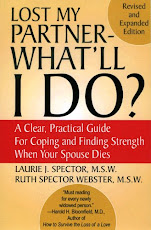
Online support groups can be a convenient way to find reassurance and connection with others who have lost their spouse/partner. We’ve excerpted some useful pointers from
“Online Grief Support Group” by
Mary Beth Adonmaitis from the
Death and Dying category of lovetoknow.com.
According to Ms. Adonmaitis, “Whatever stage of the bereavement process you are in, you can always seek online support. Many choose this style of therapy because grieving about their loved ones happens from the privacy of their own homes. Most of these groups are founded by those who have lost a loved one or who have done extensive research about bereavement support.
Online support groups offer individuals:
-A chance to share their grief with others who went through the same situation.
-Information about memorials and funerals.
-A place to talk about their loved ones without feeling un-welcomed or uncomfortable.
-A safe place to post poetry, photographs, journals or articles about the person who died.
-The ability to remain anonymous.
-An opportunity to meet locals who can offer support; many times people who meet online and live in the same area often get together.
-A secure place to share joys, sorrows and memories about the one who died.
-The chance to feel less lonely in your grief.
-A place to learn coping skills, stress management techniques and ways to relax.
-An all-around sounding board.
Beware of the Dangers
Just as there are dangers to online dating or social networking, there are risks to joining an online grief support. Visitors to these sites should heed the following warnings:
Never give out personal information to anyone. This includes your full name, address, phone number, computer or online passwords, credit card or bank information or other identifying factors.
Make sure the group you join is a secure private website. Registration should be required and approved.
Legitimate groups will not ask for a registration fee; many will take donations since they are non-profit organizations, but it is not mandated.
Do not believe everything you read. It's hard to believe that scam artists invade personal and emotional sites such as this, but they do.
Report suspicious behaviors to the group's moderator or website owner.
Be careful what you post. If you are unsure about the website, don't post photographs of your loved one. It is very easy to steal someone's picture on the Internet.”
In a final note, Ms. Adomaitis adds, “Support groups, whether they are online or in-person do not and cannot resolve a person's grief. Nothing can do that, because in one way or another, that grief will always be present. However, the person who received the support can now learn to lead a new normal life, knowing that it's okay to be happy again”.
Initial Author: Mary Beth Adomaitis
Recent Contributors: Gregory Thompson, Debbie Vasen Read the
complete post.

